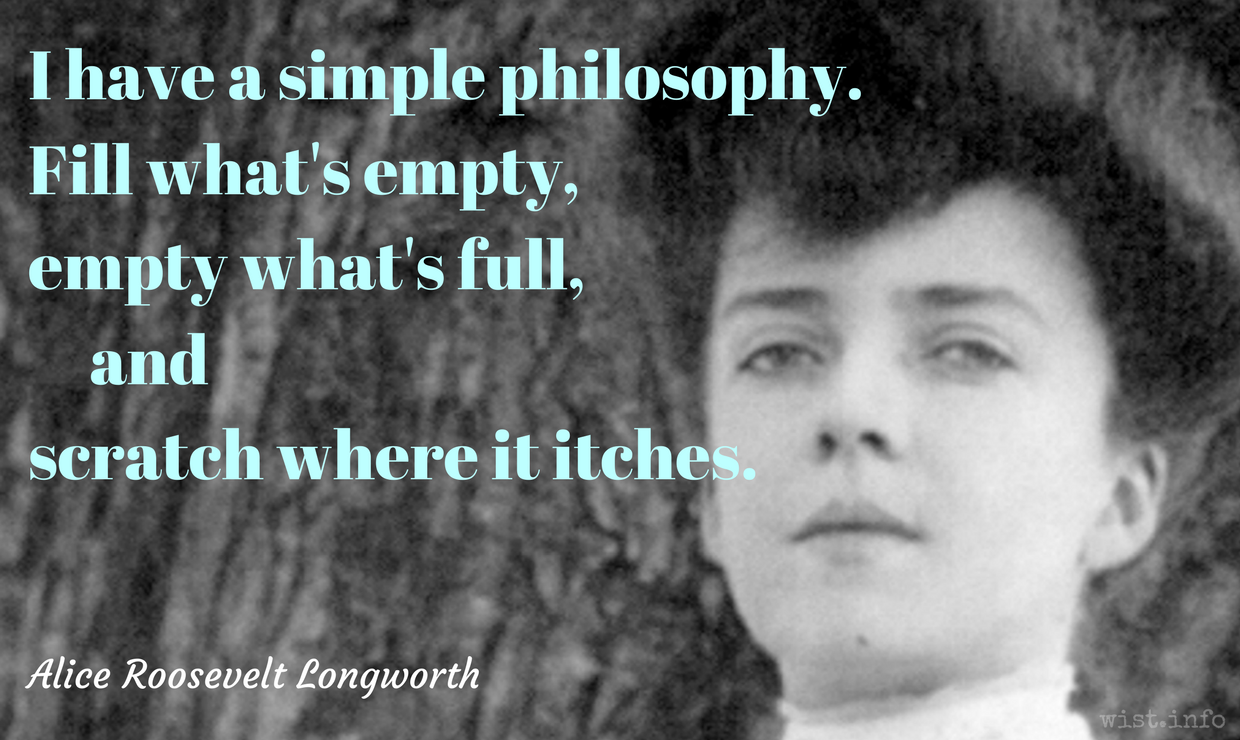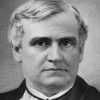No play is rubbish if it pleases and if it takes money at the door.
Quotations about:
satisfaction
Note not all quotations have been tagged, so Search may find additional quotes on this topic.
Total contentment is only for cows.
Bette Midler (b. 1945) American singer, actress, comedian, author
The Saga of Baby Divine (1983)
(Source)
COMPROMISE, n. Such an adjustment of conflicting interests as gives each adversary the satisfaction of thinking he has got what he ought not to have, and is deprived of nothing except what was justly his due.
Ambrose Bierce (1842-1914?) American writer and journalist
“Compromise,” The Cynic’s Word Book (1906)
(Source)
Included in The Devil's Dictionary (1911). Originally published in the "Devil's Dictionary" column in the San Francisco Wasp (1881-08-12).
That’s all there is to success is satisfaction.
If people knew the story of their lives how many would then elect to live them?
Cormac McCarthy (1933-2023) American novelist, playwright, screenwriter
The Crossing [Quijada] (1994)
(Source)
Often mis-cited to All the Pretty Horses (1992), the first part of the Border Trilogy (this is the second).
If you are foolish enough to be contented, don’t show it, but grumble with the rest; and if you can do with a little, ask for a great deal. Because if you don’t you won’t get any.
Jerome K. Jerome (1859-1927) English writer, humorist [Jerome Klapka Jerome]
“On Getting On In the World,” The Idle Thoughts of an Idle Fellow (1889)
(Source)
You have reached the pinnacle of success as soon as you become uninterested in money, compliments, or publicity.
Orlando A. Battista (1917-1995) Canadian-American chemist, aphorist
Quotoons: A Speaker’s Dictionary, No. 3962 (1977 ed.)
(Source)
Often misattributed to Thomas Wolfe. More discussion about the origin of quotation: You Have Reached the Pinnacle of Success as Soon as You Become Uninterested in Money, Compliments, or Publicity – Quote Investigator®.
Mirth pleaseth some, to others ’tis offence,
Some commend plain conceit, some profound sense;
Some wish a witty Jest, some dislike that,
And most would have themselves they know not what.
Then he that would please all, and himself too,
Takes more in hand than he is like to do.Benjamin Franklin (1706-1790) American statesman, scientist, philosopher, aphorist
Poor Richard (1733)
(Source)
But the best state for human nature is that in which, while no one is poor, no one desires to be richer, nor has any reason to fear being thrust back, by the efforts of others to push themselves forward.
John Stuart Mill (1806-1873) English philosopher and economist
Principles of Political Economy, Book 4, ch. 6 (1871)
(Source)
Some thirty poems in the book
Are poor, you say. Egad!
If you’ve found thirty good ones, too,
The book is great, not bad.[‘Triginta toto mala sunt epigrammata libro.’
Si totidem bona sunt, Lause, bonus liber est.]Martial (AD c.39-c.103) Spanish Roman poet, satirist, epigrammatist [Marcus Valerius Martialis]
Epigrams [Epigrammata], Book 7, epigram 81 (7.81) (AD 92) [tr. Marcellino (1968)]
(Source)
"To Lausus." (Source (Latin)). Alternate translations:
Thou thirty epigrams dost note for bad:
Call my book good if thirty good it had.
[tr. Killigrew (1695)]
For thirty bad epigrams here you may look:
If as many good ones, it is a good book.
[tr. Elphinston (1782), Book 12, ep. 7]
In this whole book there are thirty bad epigrams; if there as many good ones, Lausus, the book is good.
[tr. Bohn's Classical (1859)]
"Take all your book, and there are thirty bad epigrams in it." If as many are good, Lausus, the book is a good one.
[tr. Ker (1919)]
You’ve read my poems and condemn
Some thirty, so you say, of them:
The book’s a good one I submit,
If there are thirty good in it.
[tr. Pott & Wright (1921), "Proportions"]
"There are thirty bad epigrams
in your book, at least."
If there are that many good ones,
Lausus, I'll be pleased.
[tr. Bovie (1970), mislabeled 7.18]
"There are thirty bad epigrams in the whole book." If there as many good ones, Lausus, it's a good book.
[tr. Shackleton Bailey (1993)]
"Your book as thirty epigrams unneeded."
I've only thirty clunkers? I've succeeded.
[tr. Wills (2007)]
"In this book, thirty poems are bad," you state.
Lausus, if thirty are good, the book is great.
[tr. McLean (2014)]
The measure of achievement is not winning awards. It’s doing something that you appreciate, something you believe is worthwhile. I think of my strawberry souffle. I did that at least twenty-eight times before I finally conquered it.
Those three things — autonomy, complexity, and a connection between effort and reward — are, most people will agree, the three qualities that work has to have if it is to be satisfying.
Malcolm Gladwell (b. 1963) Anglo-Canadian journalist, author, public speaker
Outliers: The Story of Success, ch. 5, sec. 10 (2008)
(Source)
The three horrors of modern life — talk without meaning, desire without love, work without satisfaction.
Mignon McLaughlin (1913-1983) American journalist and author
The Neurotic’s Notebook, ch. 5 (1963)
(Source)
There is surfeit in everything. I have seen
men abandon beautiful women for ugly ones,
and someone sated with rich meals return
with pleasure to inferior fare.[κόρος δὲ πάντων· καὶ γὰρ ἐκ καλλιόνων
λέκτροις ἐπ᾽αἰσχροῖς εἶδον ἐκπεπληγµένους,
δαιτὸς δὲ πληρωθείς τις ἄσµενος πάλιν
φαύλῃ διαίτῃ προσβαλὼν ἥσθη στόµα.]Euripides (485?-406? BC) Greek tragic dramatist
Antiope [Αντιοπη], frag. 213 (Kannicht) (c. 410 BC)
(Source)
(Source (Greek)). Barnes frag. 86, Musgrave frag. 27, TGF frag. 212. Alternate translations:
But all things satiate; oft have I beheld
The faithless Husband quit his beauteous Wife,
Lur'd by some vile amour: thus pall'd with dainties
The appetite regales on coarser food.
[tr. Wodhall (1809)]
There is a surfeit of all things; for I have seen men
drive away a beautiful wife for an ugly one,
and full from banquet someone glad to sit and crack
his teeth against poor fare.
[tr. Will (2015)]
OLD LADY: Our content
Is our best having.William Shakespeare (1564-1616) English dramatist and poet
Henry VIII, Act 2, sc. 3, l. 27ff (2.3.27-28) (1613)
(Source)
I have the simplest tastes. I am always satisfied with the best.
Oscar Wilde (1854-1900) Irish poet, wit, dramatist
(Attributed)
(Source)
Quoted in Edgar Saltus, Oscar Wilde: An Idler's Impression (1917), as a comment made to him by Wilde.
Also attributed to Winston Churchill, with less foundation.
For more discussion about this quotation: I Have the Simplest Tastes; I Am Always Satisfied with the Best – Quote Investigator.
Much of the joy of science is the joy of solid work done by skilled workmen. Many of us are happy to spend our lives in collaborative efforts where to be reliable is more important than to be original. There is a great satisfaction in building good tools for other people to use.
Freeman Dyson (1923-2020) English-American theoretical physicist, mathematician, futurist
Disturbing the Universe, ch. 1 (1979)
(Source)
Maybe there really is no satisfaction in revenge, but I can tell you one thing for sure: There’s no satisfaction in letting someone get away with ruining your life, either.
Me kindly Rome loves, quotes my books, and buys them;
But till that critic feigning to despise them
Blushed and turned pale, then yawned and looked confounded,
I never felt my fame was surely grounded.[Laudat, amat, cantat nostros mea Roma libellos,
Meque sinus omnes, me manus omnis habet.
Ecce rubet quidam, pallet, stupet, oscitat, odit.
Hoc volo: nunc nobis carmina nostra placent.]Martial (AD c.39-c.103) Spanish Roman poet, satirist, epigrammatist [Marcus Valerius Martialis]
Epigrams [Epigrammata], Book 6, epigram 60 (6.60) (AD 91) [tr. Pott & Wright (1921)]
(Source)
(Source (Latin)). Alternate translations:
Rome lauds, & loves, & reades my works,
and singes them every where:
Each fist doth hld me clutched fast,
eache bosome me doth beare.
One bluseth lo, as red as fyre,
anone as pale as claye:
Anone he looks astonished,
as one did hym dismaye:
Sometime he mumping mockes and moes,
sometime he doth repine:
Ymarrie, this is that I would:
now please me verses mine.
[tr. Kendall (1577)]
Rome hugs my verse, and cries up for rare,
My books each hand and ev'ry bosom bear;
There's one yet lowers, disdains, is ill at ease:
I'm glad; my verses now myself do please.
[tr. Killigrew (1695)]
The town beloves, applauds, attunes my strains;
Each hand engrasps them, and each bosom gains:
See one change color, grin, and gape with hate!
This crowns my wish: be this my Muse's fate.
[tr. Elphinston (1782)], Book 2, ep. 16]
Rome, city of my affections, praises, loves, and recites my compositions;
I am in every lap, and in every hand.
But see, yon gentleman grows red and pale by turns, looks amazed, yawns, and, in fact, hates me.
I am delighted at the sight; my writings now please me.
[tr. Bohn's Classical (1859), ep. 61]
Quite friendly, Rome applauds my lay;
dotes on it, quotes it day by day.
My verses every pocket fill,
And every hand bethumbs me still.
See, yonder man turns red and white,
Winces, and yawns disgusted quite.
This I enjoy; by this I tell
That now my verses please me well.
[tr. Webb (1879), ep. 61]
My Rome praises, loves, and hums my verses,
and every pocket, every hand holds me.
See, yonder fellow turns red, turns pale, is dazed, yawns, curses! v This is what I want; now my verses please me!
[tr. Ker (1919)]
All Rome extols and loves and quotes my lines
And every bosom holds them, every hand;
See one that reddens, pales, yawns, stares and pines.
Ah! now at last their worth I understand.
[tr. Francis & Tatum (1924), #306 (ep. 6.61), "A Hit"]
Rome praises, loves, and sings my little verses;
They're in all hands, all pockets, and all purses.
Look there! One blushes, pales, gasps, yawns, and curses.
That's what I want! I'm happy with my verses.
[tr. Barth (1988)]
All Rome is mad about my book:
It's praised, they hum the lines, shops stock it,
It peeps from every hand and pocket.
There's a man reading it! Just look --
He blushes, turns pale, reels, yawns, curses.
That's what I'm after. Bravo, verses!
[tr. Michie (1972)]
My Rome praises my little books, loves them, recites them; I am in every pocket, every hand. Look, somebody turns red, turns pale, is dazed, yawns, is disgusted. This I want. Now my poems please me.
[tr. Shackleton Bailey (1993)]
For my small books Rome's gone utterly mad;
I'm quite ubiquitous -- call it a fad.
Look, there -- see that fellow, leafing, curious.
First he blushes deeply, then he's furious;
A moment later his eyes glaze over;
He yawns, flips a page, then reels in horror.
This mercurial response I thrill to see;
Why, then my epigrams even please me!
[tr. Schmidgall (2001)]
Rome praises, loves, and quotes my little books,
I’m there in every pocket, every hand.
See them blush, turn white, stunned, yawn, disgusted.
I like it: now’s when my poems give me delight.
[tr. Kline (2006)]
He reads my verses, just to be in fashion.
But finds himself whipsawed by sudden passion.
He frowns, then chortles -- chokes at what he reads --
And calls them the most infamous of screeds,
Then he goes pale, as under some indicting --
You've got him, poems! That's what I call writing.
[tr. Wills (2007)]
Rome praises, loves, recites my little books.
I'm carried in each hand or pocket. See!
Someone blushes, gapes, yawns, or hates it.
That's what I want: my verse now pleases me.
[tr. McLean (2014)]
My Rome praises, loves and quotes my books,
which fill all pockets and all hands.
Readers blush, then pale, look dazed, curse, swear.
Yes! Yes! This is what I’d always planned.
[tr. Matthews]
Most people, when they are left free to fill their own time according to their own choice, are at a loss to think of anything sufficiently pleasant to be worth doing. And whatever they decide on, they are troubled by the feeling that something else would have been pleasanter. To be able to fill leisure intelligently is the last product of civilization, and at present very few people have reached this level.
Bertrand Russell (1872-1970) English mathematician and philosopher
The Conquest of Happiness, ch. 14 (1930)
(Source)
Wise is he who instead of grieving over what he lacks delights in what he has.
[Εὐγνώμων ὁ μὴ λυπεόμενος ἐφ’ οἷσιν οὐκ ἔχει, ἀλλὰ χαίρων ἐφ’ οἷσιν ἔχει.]
Democritus (c. 460 BC - c. 370 BC) Greek philosopher
Frag. 231 (Diels) [tr. @sententiq (2016)]
(Source)
Original Greek. Diels citation "231 (61 N.)"; collected in Joannes Stobaeus (Stobaios) Anthologium III, 17, 25. Bakewell lists this under "The Golden Sayings of Democritus." Freeman notes this as one of the Gnômae, from a collection called "Maxims of Democratês," but because Stobaeus quotes many of these as "Maxims of Democritus," they are generally attributed to the latter. Alternate translations:
- "A sensible man takes pleasure in what he has instead of pining for what he has not." [tr. Bakewell (1907)]
- "The right-minded man is he who is not grieved by what he has not, but enjoys what he has." [tr. Freeman (1948)]
- "A man of sound judgement is not grieved by what he does not possess but rejoices in what he does possess." [tr. Barnes (1987)]
- "A sensible man does not grieve for what he has not, but enjoys what he has." [Source]
Happiness does not come from doing easy work but from the afterglow of satisfaction that comes after the achievement of a difficult task that demanded our best.
Wilferd A. Peterson (1900-1995) American writer, magazine editor
“The Art of Happiness,” This Week Magazine (1961-02-04)
(Source)
Collected in The Art of Living (1961).
Almost universally credited, without citation, to Theodore Isaac Rubin, but I've been unable to find the phrase in Rubin's works or credited to him earlier than Peterson's essay.
The best is the enemy of the good.
[Il meglio, e l’inimico del bene]
Voltaire (1694-1778) French writer [pseud. of Francois-Marie Arouet]
Letter to the Duc de Richelieu (18 Jun 1743)
(Source)
A signature phrase of Voltaire's, attributed (by him) to a wise or sage Italian. His French translation is "Le mieux est l’ennemi du bien." Other mentions include an entry on "Art Dramatique" in his Philosophical Dictionary (1764), and the poem "La Bégueule" (1772).
It is of the nature of desire not to be satisfied, and most men live only for the gratification of it.
[ἄπειρος γὰρ ἡ τῆς ἐπιθυμίας φύσις, ἧς πρὸς τὴν ἀναπλήρωσιν οἱ πολλοὶ]
Aristotle (384-322 BC) Greek philosopher
Politics [Πολιτικά], Book 2, ch. 7, sec. 19 / 1267b.4 [tr. Jowett (1885)]
(Source)
Original Greek. Alt. trans.:
- "For it is the nature of our desires to be boundless, and many live only to gratify them." [tr. Ellis (1912)]
- "For appetite is in its nature unlimited, and the majority of mankind live for the satisfaction of appetite." [tr. Rackham (1924)]
- "For the nature of desire is without limit, and it is with a view to satisfying this that the many live. [tr. Lord (1984)]
It seems to me you have had enough of life when you have had your fill of all its activities. Little boys enjoy certain things, but older youths to not yearn for these. Young adulthood has its delights, but middle age does not desire them. There are also pleasures of middle age, but these are not sought in old age. And so, just as the pleasures of earlier ages fall away, so do those of old age. When this happens, you have had enough of life, and it is time for you to pass on.
[Omnino, ut mihi quidem videtur studiorum omnium satietas vitae facit satietatem. Sunt pueritiae studia certa: num igitur ea desiderant adulescentes? Sunt ineuntis adulescentiae: num ea constans iam requirit aetas, quae media dicitur? Sunt etiam eius aetatis: ne ea quidem quaeruntur in senectute. Sunt extrema quaedam studia senectutis: ergo, ut superiorum aetatum studia occidunt, sic occidunt etiam senectutis; quod cum evenit, satietas vitae tempus maturum mortis affert.]
Marcus Tullius Cicero (106-43 BC) Roman orator, statesman, philosopher
De Senectute [Cato Maior; On Old Age], ch. 20 / sec. 76 (20.76) (44 BC) [tr. Freeman (2016)]
(Source)
(Source (Latin)). Alternate translations:
And he that is full & replete of all the studyes & werkys perteynent to every age he is replete and wery of the tyme of this life so that he doubte not in no wise the deth as it seemyth me rightfully & as I preve it by my self. And note ye for a good advertisement to every man for to bere in remembraunce and for his prouffite. That certayne thyngys be wherin pueryce callid childhode which is the seconde age puttith his studye and his entendyng in thynges accordyng to his agrement. And the adolescente men whiche be undir the thidd age desyren in no wise the thynges and the besynes wherin puerice studyeth and occupyeth. And certeyne thynges be wherin the men studyen & occupyen them in begynnyng of their adolescencye. Also certayne thynges be in whiche yong age whiche is the fourth & the mene age puttith not his studye & besynesse in his precedent ages though the man had employed & occupied hym in the othir first ages which be smaller and of lesse degree. Yong age is callid the age stable & meane by cause that it holdith the meane betwixt adolescence & olde age And cesseth than the man for to do lighe thynges and folyes And as theene or nevir the man is stable & hole in body in witt & undirstōding the thynges and the werkys in whiche yong men studyen and occupye them been suche that olde men rek nevir of it. But namely olde age hath delectacyon in some thynges in his laste dayes wheryn he studyeth and employeth his wittys. How be it thenne that the studyes and the werkys of the fyve first ages dyen and seace in some tyme and seasons they in suche wise seacen and dyen in the besynesse studyes and the werkys of olde age whiche when they lacken in the man than he whiche is full and wery for to lyve in this worlde cometh to that tyme whiche is ripe and covenable for to dye.
[tr. Worcester/Worcester/Scrope (1481)]
But, methinks, satiety of all things causeth satiety of life. There are some fantastical and childish plays wherst young children in their childhood delight to play; shall, therefore, young men and tall fellows addict themselves to the same sembably? There are some exercises and affection swherein youthly years to enure themselves: shall the ripe and constant age (which si called the middle age of man) look to play at the same? And if this middle age there are some studies, wills, and appetites which old age careth not for. And there be some studies and exercises belonging and appropriate to old age . And therefore as the pleasure and delight of the studies and exercises in fresher and lustier ages doth in time wear away and come to an end, so doth the studies of old age in continuance and tract of time also die and vanish. And when this pleasuyre and delightful contentation begin in old men once to decrease, then doth satiety of life bring to them a convenable and mature time to die.
[tr. Newton (1569)]
Truly me thinks that the satiety of all things makes also a satiety of life. There are certain studies in children, shall young men desire them? there are others in youth, shall age require them? and there be studies in the last age: therefore as the studies of former ages fail, so do the studies of old age, so that when the satiety or fulnesse of life commeth, it bringeth also a fit time for death.
[tr. Austin (1648), ch. 21]
Satiety from all things else doth come,
Then life must to it self grow wearisome.
Those Trifles wherein Children take delight,
Grow nauseous to the young man's appetite,
And from those gaieties our youth requires,
To exercise their minds, our age retires.
And when the last delights of Age shall die,
Life in it self will find satietie.
[tr. Denham (1669)]
There are in every Stage of Life, peculiar Pleasures and Diversions, in the Pursuit of which we are employed. And as, when Boys, we are tired with such things, as pleased our Infant State, and, when advanced to a riper Age, we still grow weary of our former Diversions; so Old Age itself has its peculiar Enjoyments. Therefore, as all the several Delights, of all our different Ages, decay and grow insipid, those f our latest Years will likewise fail, and make us loath and reject them, till at last, well satisfied with Length of Days, we fall our selves, ass if it were full ripe, and fit to drop into another World.
[tr. Hemming (1716)]
'Tis a Rule with me, That the Fulness of all Things makes the Fullness of Life. Children have their Desires; must young people have the same? In some certain Studies delight Youth, must the Middle-aged too require the same? The Middle-aged have their Foibles; but they are not pursued by the Old; but Old Age has also its favourite Amusements of some Sort of other; and as the Studies of former Ages fall off from us, so do those of our Old Age at last fail us: And when that happens, then the fullness of Life brings on the fit and seasonable Moment for Death.
[tr. J. D. (1744)]
By living long we come to a Satiety in all things besides and this should naturally lead us to a Satiety of Life itself. Children we see have their particular Diversions; and does Youth, when past Childhood, pursue or desire the same? Youth also has its peculiar Exercises; and does full Manhood require these as before? Or has Old Age the same Inclinations that prevailed in more vigorous Years? We ought then to conclude, That as there is a Succession of Pursuits and Pleasures in the several Stages of Life, the one dying away, as the other advances and takes Place; so in the same Manner are those of Old Age to pass off in their Turn. And when this Satiety of Life has fully ripen'd us, we are then quietly to lie down in Death, as our last Resting-Place, where all Anxiety ends, and Cares and Fears subsist no more.
[tr. Logan (1744)]
The distaste with which, in passing through the several stages of our present being, we leave behind us the respective enjoyments peculiar to each; must necessarily, I should think, in the close of its latest period, render life itself no longer desirable. Infancy and youth, manhood and old age, have each of them their peculiar and appropriate pursuits. But does youth regret the toys of infancy, or manhood lament that no longer as a taste for the amusements of youth? The season of manhood has also its suitable objects, that are exchanged for others in old age; and these too, like all the preceding, become languid and insipt in their turn. Now when this state of absolute satiety is at length arrived; when we have enjoyed the satisfactions peculiar to old age, till we have no longer any relish remaining for them; it is then that death may justly be considered as a mature an seasonable event.
[tr. Melmoth (1773)]
In every view of it, as seems to me at least, a satiety of all pursuits produces satiety of life. Doubtless there are pursuits peculiar to boyhood; do then young men long for these? There are also pursuits proper to commencing adolescence; does that time of olife which is now settled, and is called middle-age, require them? There are also pursuits that belong to this latter period; those even are not sought after by old age. There are also certain pursuits of old age, which are the last; therefore as the pursuits of the former stages cease, so also to those of old age. And when this has come to pass, satiety of life brings on the ripe time of death.
[Cornish Bros. ed. (1847)]
On the whole, as it seems to me indeed, a satiety of all pursuits causes a satiety of life. There are pursuits peculiar to boyhood; do therefore young men regret the loss of them? There are also some of early youth; does that now settled age, which is called middle life, seek after these? There are also some of this period; neither are they looked for by old age. There are some final pursuits of old age; accordingly, as the pursuits of the earlier parts of life fall into disuse, so also do those of old age; and when this has taken place, satiety of life brings on the seasonable period of death.
[tr. Edmonds (1874)]
In fine, satiety of life, as it seems to me, creates satiety of pursuits of every kind. There are certain pursuits belonging to boyhood; do grown-up young men therefore long for them? There are others appertaining to early youth; are they required in the sedate period of life which we call middle age? This, too, has its own pursuits, and they are not sought in old age. As the pursuits of earlier periods of life fail, so in like manner do those of old age. When this period is reached, satiety of life brings a season ripe for death.
[tr. Peabody (1884)]
As a general truth, as it seems to me, it is weariness of all pursuits that creates weariness of life. There are certain pursuits adapted to childhood: do young men miss them? There are others suited to early manhood: does that settled time of life called "middle age" ask for them? There are others, again, suited to that age, but not looked for in old age. There are, finally, some which belong to old age. Therefore, as the pursuits of the earlier ages have their time for disappearing, so also have those of old age. And when that takes place, a satiety of life brings on the ripe time for death.
[tr. Shuckburgh (1895)]
To put it in a word, it seems to me
'Tis weariness of all pursuits that makes
A weary age. We have pursuits as boys,
Do young men want them? Others yet there are
Suited to growing years, are they required
By those who've reached what's termed "the middle age"?
That too enjoys its own, but are they fit
For us old me? We have our own of course,
And as the others end, just so do ours,
And when it happens, weariness of life
Proclaims that ripeness which precedes our death.
[tr. Allison (1916)]
Undoubtedly, as it seems to me at least, satiety of all pursuits causes satiety of life. Boyhood has certain pursuits: does youth yearn for them? Early youth has its pursuits: does the matured or so-called middle stage of life need them? Maturity, too, has such as are not even sought in old age, and finally, there are those suitable to old age. Therefore as the pleasures and pursuits of the earlier periods of life fall away, so also do those of old age; and when that happens man has his fill of life and the time is ripe for him to go.
[tr. Falconer (1923)]
From a more general point of view, it seems to me that once we have had our fill of all the things that have engaged our interest, we have had our fill of life itself. There are interests that are proper to childhood: does a full-grown man regret their loss? There are interests that belong to early manhood: when we reach full maturity -- what is called “middle age” -- do we look back to them with longing? Middle age itself has its special concerns; even these have lost their attraction for the old. Finally, there are interests peculiar to old age; these fall away, too, just as did those of the earlier years. When this has happened, a sense of the fullness of life tells us that it is time to die.
[tr. Copley (1967)]
When we are children, we have childish interests, but do young men miss them? And when we are middle-aged, do we want what young men want? Similarly, old men are not remotely involved in the needs of middle age; they have their own. Therefore we may argue that as the concerns of each earlier stage of life fade away, so eventually do those of old age. And when that happens, we have had enough of life and we are ready for death.
[tr. Cobbold (2012)]
Then too, I think I can safely say that when the point arrives where you have had enough of life's pursuits -- this isn't boredom but more a fullness or satisfaction -- then you have also had enough of life. There are certain pursuits of childhood which teenagers don't miss, do they? And stable, middle aged adults don't go running after the pursuits of teens, do they? And there are some interests of our middle years. therefore, just as we do not fear or regret when the pursuits of earlier stages fall away, so too the thinking person does not regret the passing of the interests of old age. And when this happens, the fullness of life brings about the time which is ripe for death.
[tr. Gerberding (2014)]
The fulfilment of all desires,
At least it seems to me, kills all life’s bliss,
And childhood certainly requires
Interests that young people do not miss,
And the tastes of youth’s initial stage
Won’t be sought after in middle age
Whose pursuits seem to be cheerless
To those in their elderliness.
Therefore as the previous life’s urges
Will set like the Sun so will old age’s.
Once life has had its fill there comes the day
On which one may suitably pass away.
[tr. Bozzi (2015)]
He’d noticed that sex bore some resemblance to cookery: it fascinated people, they sometimes bought books full of complicated recipes and interesting pictures, and sometimes when they were really hungry they created vast banquets in their imagination — but at the end of the day they’d settle quite happily for egg and chips. If it was well done and maybe had a slice of tomato.
I give it as my firmest conviction that service to a just cause rewards the worker with more real happiness and satisfaction than any other venture of life.
Carrie Chapman Catt (1859-1947) American women's suffrage activist
“The Making of A Pioneer Suffragette,” in The American Scrap Book (1928)
(Source)
I hate to be a kicker,
I always long for peace,
But the wheel that does the squeaking,
Is the one that gets the grease.Josh Billings (1818-1885) American humorist, aphorist [pseud. of Henry Wheeler Shaw]
“The Kicker” (c. 1870)
A "kicker" was idiom in the era for a complainer. This is a common citation for the origin of "the squeaky wheel gets the grease," but the existence of such a poem has never been verified. The earliest documented version of the phrase is in the Wall Street Journal (20 May 1910): "The wheel that squeaks the loudest / Is the wheel that gets the grease." The metaphor itself can be found in various versions back to at least the 15th Century.
I got rhythm, I got music,
I got my man
Who could ask for anything more?Ira Gershwin (1896-1983) American lyricist [b. Israel Gershowitz]
“I Got Rhythm”, Girl Crazy, Act 1 (1930)
(Source)
I never saw an author in my life — saving perhaps one — that did not purr as audibly as a full-grown domestic cat on having his fur smoothed the right way by a skillful hand.
Yet I think that to all living things there is a pleasure in the exercise of their energies, and that even beasts rejoice in being lithe and swift and strong. But a man at work, making something which he feels will exist because he is working at it and wills it, is exercising the energies of his mind and soul as well as of his body. Memory and imagination help him as he works. Not only his own thoughts, but the thoughts of the men of past ages guide his hands; and, as a part of the human race, he creates. If we work thus we shall be men, and our days will be happy and eventful.
William Morris (1834-1896) British textile designer, writer, socialist activist
“Useful Work versus Useless Toil,” lecture (1884)
(Source)
Printed in Signs of Change (1888).
Maturity begins when we’re content to feel we’re right about something without feeling the necessity to prove someone else wrong.
Sydney J. Harris (1917-1986) Anglo-American columnist, journalist, author
(Attributed)
Frequently attributed to Harris, but the original source has not been found. Earliest citation I could find was in Reader's Digest (1973), where it is further credited to the Publishers-Hall Syndicate.
Yet there is still this difference between man and all other animals — he is the only animal whose desires increase as they are fed; the only animal that is never satisfied.
ENOBARBUS: Age cannot wither her, nor custom stale
Her infinite variety; other women cloy
The appetites they feed, but she makes hungry
Where most she satisfies.William Shakespeare (1564-1616) English dramatist and poet
Antony and Cleopatra, Act 2, sc. 2, l. 276ff (2.2.276-279) (1607)
(Source)
Leave well — even “pretty well” — alone: that is what I learn as I get old.
Edward FitzGerald (1809-1883) English writer, poet, translator
Letter to W. F. Pollock (7 Dec 1869)
(Source)
Ambition has its disappointments to sour us, but never the good fortune to satisfy us. Its appetite grows keener by indulgence and all we can gratify it with at present serves but the more to inflame its insatiable desires.
Benjamin Franklin (1706-1790) American statesman, scientist, philosopher, aphorist
“On True Happiness,” The Pennsylvania Gazette (20 Nov 1735)
(Source)
I have a simple philosophy. Fill what’s empty, empty what’s full, and scratch where it itches.
Dreadful will be the day when the world becomes contented, when one great universal satisfaction spreads itself over the world. Sad will be the day for every man when he becomes absolutely contented with the life that he is living, with the thoughts that he is thinking, with the deeds that he is doing, when there is not forever beating at the doors of his soul some great desire to do something larger which he knows that he was meant and made to do because he is a child of God.
Unless each day can be looked back upon by an individual as one in which he has had some fun, some joy, some real satisfaction, that day is a loss. It is un-Christian and wicked, in my opinion, to allow such a thing to occur.
Dwight David Eisenhower (1890-1969) American general, US President (1953-61)
Speech, Commencement, Dartmouth College (14 Jun 1953)
(Source)
Most people would succeed in small things if they were not troubled with great ambitions.
Why do men delight in work? Fundamentally, I suppose, because there is a sense of relief and pleasure in getting something done — a kind of satisfaction not unlike that which a hen enjoys on laying an egg.
H. L. Mencken (1880-1956) American writer and journalist [Henry Lewis Mencken]
Minority Report: H.L. Mencken’s Notebooks, #34 (1956)
(Source)
I know, indeed, of nothing more subtly satisfying and cheering than a knowledge of the real good will and appreciation of others. Such happiness does not come with money, nor does it flow from a fine physical state. It cannot be brought. But it is the keenest joy, after all, and the toiler’s truest and best reward.
William Dean Howells (1837-1920) American author, literary critic, and playwright
Interview with Orison Swett Marden, Success Magazine
(Source)
Quoted in Marden, How They Succeeded: Life Stories of Successful Men Told by Themselves, ch. 11 (1901).
It is a salutary discipline to consider the vast number of books that are written, the fair hopes with which their authors see them published, and the fate which awaits them. What chance is there that any book will make its way among that multitude? And the successful books are but the successes of a season. Heaven knows what pains the author has been at, what bitter experiences he has endured and what heartache suffered, to give some chance reader a few hours’ relaxation or to while away the tedium of a journey. And if I may judge from the reviews, many of these books are well and carefully written; much thought has gone into their composition; to some even has been given the anxious labour of a lifetime. The moral I draw is that the writer should seek his reward in the pleasure of his work and in release from the burden of his thoughts; and, indifferent to aught else, care nothing for praise or censure, failure or success.
Whenever Richard Cory went down town,
We people on the pavement looked at him:
He was a gentleman from sole to crown,
Clean-favored and imperially slim.And he was always quietly arrayed,
And he was always human when he talked;
But still he fluttered pulses when he said,
“Good Morning!” and he glittered when he walked.And he was rich, yes, richer than a king,
And admirably schooled in every grace:
In fine — we thought that he was everything
To make us wish that we were in his place.So on we worked and waited for the light,
And went without the meat and cursed the bread,
And Richard Cory, one calm summer night,
Went home and put a bullet in his head.
Want is a growing giant whom the coat of Have was never large enough to cover.
Ralph Waldo Emerson (1803-1882) American essayist, lecturer, poet
“Wealth,” The Conduct of Life, ch. 3 (1860)
(Source)
CAESAR: Let me have men about me that are fat;
Sleek-headed men and such as sleep o’ nights:
Yon Cassius has a lean and hungry look;
He thinks too much; such men are dangerous.
Riches rather enlarge than satisfy Appetites.
Thomas Fuller (1654-1734) English physician, preacher, aphorist, writer
Gnomologia: Adages and Proverbs, #4048 (1732)
(Source)





















































